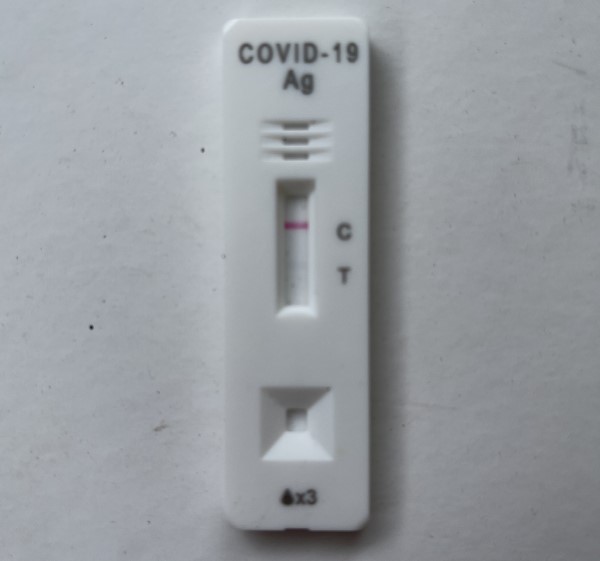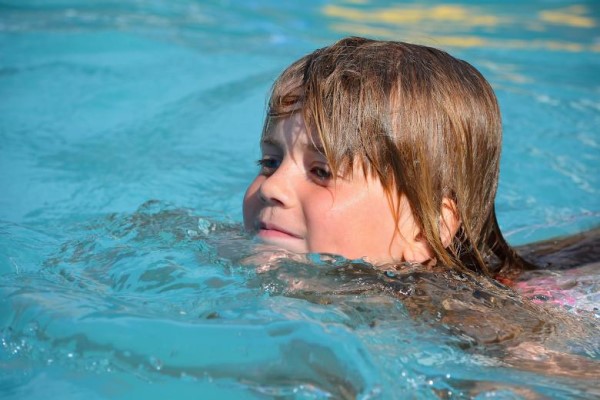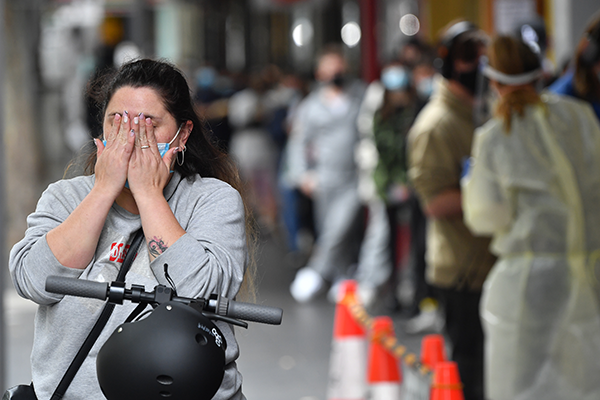Selected
- Details
- Written by Grant Broadcasters
- Category: Selected
- Hits: 128

Overpriced rapid antigen test kits should be a thing of the past as new laws kick in.
As of 1am on Saturday January 8, rapid test kits are listed on Australia's biosecurity determination, making price gouging on the essential item illegal.
Retailers caught marking up test kits by more than 20 per cent of the supply price now face a penalty of $66,000 and up to five years in jail.
At the beginning of the pandemic personal protective equipment such as masks and hospital gowns as well as hand sanitiser were added to the biosecurity list to prevent prices being hiked.
The determination also controls the export of items on the list to prevent overseas buyers taking Australian stocks.
Health Minister Greg Hunt told 2GB on Thursday the federal government was taking "the strongest possible actions" to prevent profiteering in a time of need.
Meanwhile states are moving to record positive rapid antigen test results as part of daily case numbers, alongside PCR test results.
Victoria and Tasmania have introduced a system where people who test positive to a rapid test can inform state health authorities.
Queensland is establishing a hotline to record positive rapid tests and NSW is working to have a similar reporting system through the Service NSW app.
The reporting requirements come amid concerns the number of people with COVID-19 is far higher than the official figures reported.
On Friday night Federal Treasurer Josh Frydenberg tweeted that he had tested positive for COVID-19, had the "common symptoms" and was isolating with his family.
"My thoughts are with all those who have COVID - this is a difficult time but we will get through this," he said.
Friday was another record day of case numbers with more than 78,000 reported in Australia.
There were 38,625 new cases and 11 deaths in NSW, while there were 21,728 infections and six fatalities in Victoria.
Queensland had 10,953 new cases, while South Australia and Tasmania registered 3707 and 1489 cases respectively.
The ACT had 1246 cases, the first time the territory had daily case numbers above 1000, with the Northern Territory having 412 and Western Australia recording six among travellers.
© AAP 2022
Image: News
- Details
- Written by Grant Broadcasters
- Category: Selected
- Hits: 150

One in four Australians are weak swimmers or can't swim at all as the nation records an increase in drowning deaths, new research has revealed.
The Royal Life Saving Society estimated 40 per cent of children leave primary school without reaching basic water safety benchmarks like the ability to swim 50 metres or float for two minutes.
When asked about why they couldn't swim, 36 per cent of respondents reported fear of the water and 11 per cent said it was because their parents also could not swim.
Since the start of summer, 43 people have drowned, a 23 per cent increase compared with the same time last year.
Thirteen of those deaths were at inland waterways and the society's chief executive Justin Scarr said few people appreciate how dangerous rivers, lakes and dams can be.
"The calm appearance can often hide steep drop-offs, currents, and debris, and create a false sense of safety relative to beaches," Mr Scarr said.
He said the holiday message the organisation was "almost sick" of delivering was to avoid drinking alcohol when swimming.
Almost a quarter of those surveyed said they sometimes went in the water after consuming alcohol. Respondents from Queensland and Western Australia were more likely to admit to this behaviour.
Sports Minister Richard Colbeck said swimming teachers are being encouraged to return to the pool to strengthen skills and save lives.
"This season's drowning toll is too high," Mr Colbeck said.
"It only takes a few seconds for somebody to encounter trouble in the water and we know only too well the consequences this has on families."
© AAP 2022
Image: https://www.stockvault.net/photo/196404/swimming (free image)
- Details
- Written by Grant Broadcasters
- Category: Selected
- Hits: 132

Multiple states and territories have brought back in some pandemic restrictions in a bid to suppress the spread of the infectious Omicron variant.
As case numbers continue to climb across the country, NSW has moved to suspend elective surgery, while singing and dancing in hospitality venues will be banned.
Major events in the state will be able to go ahead, but organisers will have their COVID-safe plans re-examined by health officials.
Meanwhile, Victoria has already reintroduced density limits in hospitality venues, and the Northern Territory has introduced a territory-wide lockout for the unvaccinated.
Queensland Premier Annastacia Palaszczuk said the state was considering suspending elective surgery as virus numbers rise, and urged people to work from home if possible.
She said the return to schools could also be postponed, with the peak of the Omicron wave expected to hit the state at the end of the month.
It comes as more than 78,000 cases of COVID-19 were reported across the country on Friday, yet another one-day national high for new infections.
Daily cases across the country have more than doubled in just the past week.
There were 38,625 new cases and 11 deaths in NSW, while there were 21,728 infections and six fatalities in Victoria.
Queensland had 10,953, while South Australia and Tasmania registered 3707 and 1489 cases respectively.
The ACT had 1246 cases, the first time the territory had daily case numbers above 1000, with the Northern Territory having 412.
Australian Medical Association president Dr Omar Khorshid said health systems across the country had been struggling with the explosion of cases.
"The reality is our hospitals are under extraordinary pressure, and those long-suffering staff who have had a very difficult couple of years ... they're facing huge demand at the front door of the ED," Dr Khorshid told the Ten Network.
"It's just not true to say our health system is so resilient it can cope with anything. There are limits, unfortunately."
The rise in cases has led to a boost in demand for rapid antigen tests, which has caused widespread shortages and reports of price gouging at some retailers.
Large queues have been seen at PCR testing clinics across the country following the rapid test shortage.
Labor health spokesman Mark Butler told ABC radio Australia was at risk from a lack of rapid tests.
"There is a very serious risk the Australian community is going to be dumped by this fourth wave because Scott Morrison failed to do the hard work," he said.
"The critical weapons in the fight against Omicron ... are to make sure we're getting boosters into people's arms and to ensure we have a comprehensive rapid testing regime and (the prime minister) failed at both of them."
Mr Morrison said 200 million rapid tests would be available in coming weeks but ruled out making them universally free. The government will instead provide 10 tests over a three-month period to more than six million concession cardholders.
Nearly three million people aged 16 and over have received their booster dose since the booster rollout began.
The time frame between doses was shortened earlier this week from five to four months between the second and third dose.
That will shorten again to three months by the end of January.
© AAP 2022
Photo: People queue at a walk-in COVID-19 testing site in Melbourne. (AAP Image/Joel Carrett)
- Details
- Written by Grant Broadcasters
- Category: Selected
- Hits: 134

Restrictions on the number of people allowed in cafes, bars and restaurants are returning to Victoria after the state recorded 21,997 new COVID-19 cases.
Density limits will be reintroduced from Friday, Health Minister Martin Foley announced on Thursday.
The new one person per two square metre rule for indoor hospitality and entertainment venues comes after one in three people who got tested returned a positive result.
Cinemas and theatres, where people are seated and masked, will be exempt.
The latest figures include six new deaths, and a rise to 631 people in hospital. There are 51 people in intensive care and 22 on ventilators.
Mr Foley will also sign off on a new category of COVID-19 contact on Thursday.
Anyone who returns a positive rapid antigen test is being classified as a "probable case".
He said the category, made official from midnight, would impose the same obligations and rights on people who have a positive PCR test, including access to clinical support and state and federal financial support.
"The goal is to make sure that we have less time at testing centres and that, as a result, people focus more quickly on the thing that is most important - getting through that COVID infective period and getting better with the support you need as quick as possible," he said.
It comes a day after national cabinet agreed people who record a positive result from a rapid antigen test will no longer have to get their results confirmed by a PCR.
Mr Foley said he appreciated the shortage of rapid antigen tests was causing transitional issues.
Victoria has ordered an extra 10 million rapid tests, taking the total number headed for the state to 44 million.
The first of those are expected to be deployed in coming days, though it's unclear how they will be distributed.
By 9am on Thursday there were 35 state-run PCR testing sites closed because they were over capacity.
VICTORIA'S LATEST COVID-19 FIGURES:
* Active cases: 61,120
* Hospital cases: 631, up 40
* Hospital cases seven-day average: 537
* Active cases in ICU: 51
* Cleared cases in ICU: 49
* Cases on a ventilator: 22
© AAP 2022
Photo: Victorian Health Minister Martin Foley (AAP Image/Con Chronis)
Page 99 of 191